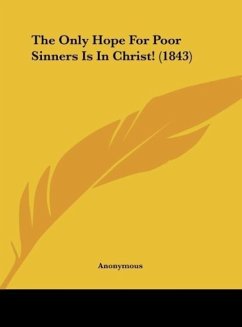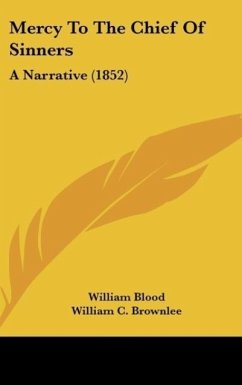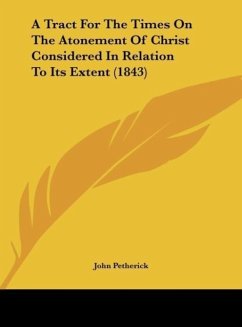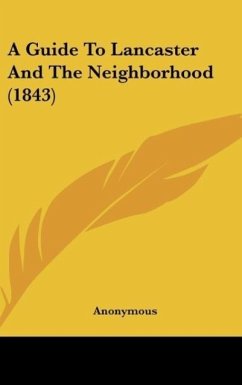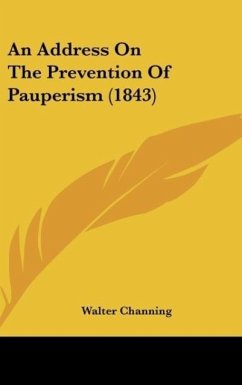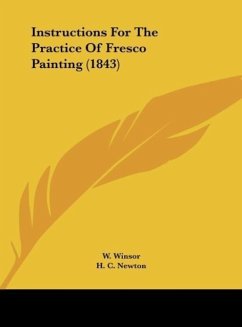Anonymous
The Only Hope For Poor Sinners Is In Christ! (1843)
Anonymous
The Only Hope For Poor Sinners Is In Christ! (1843)
- Gebundenes Buch
- Merkliste
- Auf die Merkliste
- Bewerten Bewerten
- Teilen
- Produkt teilen
- Produkterinnerung
- Produkterinnerung
This book is a facsimile reprint and may contain imperfections such as marks, notations, marginalia and flawed pages.
Andere Kunden interessierten sich auch für
![Mercy To The Chief Of Sinners Mercy To The Chief Of Sinners]() William BloodMercy To The Chief Of Sinners27,99 €
William BloodMercy To The Chief Of Sinners27,99 €![The Heart Of Christ In Heaven Towards Sinners On Earth (LARGE PRINT EDITION) The Heart Of Christ In Heaven Towards Sinners On Earth (LARGE PRINT EDITION)]() Thomas GoodwinThe Heart Of Christ In Heaven Towards Sinners On Earth (LARGE PRINT EDITION)37,99 €
Thomas GoodwinThe Heart Of Christ In Heaven Towards Sinners On Earth (LARGE PRINT EDITION)37,99 €![What Is The Church? The Question Answered In An Essay, Showing That The Church Of Christ Is One, Holy, Catholic, Apostolic (1843) What Is The Church? The Question Answered In An Essay, Showing That The Church Of Christ Is One, Holy, Catholic, Apostolic (1843)]() Francis Bonaventure GourrierWhat Is The Church? The Question Answered In An Essay, Showing That The Church Of Christ Is One, Holy, Catholic, Apostolic (1843)25,99 €
Francis Bonaventure GourrierWhat Is The Church? The Question Answered In An Essay, Showing That The Church Of Christ Is One, Holy, Catholic, Apostolic (1843)25,99 €![A Tract For The Times On The Atonement Of Christ Considered In Relation To Its Extent (1843) A Tract For The Times On The Atonement Of Christ Considered In Relation To Its Extent (1843)]() John PetherickA Tract For The Times On The Atonement Of Christ Considered In Relation To Its Extent (1843)24,99 €
John PetherickA Tract For The Times On The Atonement Of Christ Considered In Relation To Its Extent (1843)24,99 €![A Guide To Lancaster And The Neighborhood (1843) A Guide To Lancaster And The Neighborhood (1843)]() AnonymousA Guide To Lancaster And The Neighborhood (1843)27,99 €
AnonymousA Guide To Lancaster And The Neighborhood (1843)27,99 €![An Address On The Prevention Of Pauperism (1843) An Address On The Prevention Of Pauperism (1843)]() Walter ChanningAn Address On The Prevention Of Pauperism (1843)26,99 €
Walter ChanningAn Address On The Prevention Of Pauperism (1843)26,99 €![Instructions For The Practice Of Fresco Painting (1843) Instructions For The Practice Of Fresco Painting (1843)]() Instructions For The Practice Of Fresco Painting (1843)25,99 €
Instructions For The Practice Of Fresco Painting (1843)25,99 €-
-
-
This book is a facsimile reprint and may contain imperfections such as marks, notations, marginalia and flawed pages.
Produktdetails
- Produktdetails
- Verlag: Kessinger Publishing, LLC
- Seitenzahl: 26
- Erscheinungstermin: 23. Mai 2010
- Englisch
- Abmessung: 286mm x 221mm x 6mm
- Gewicht: 354g
- ISBN-13: 9781161976021
- ISBN-10: 1161976027
- Artikelnr.: 31023777
- Herstellerkennzeichnung
- Libri GmbH
- Europaallee 1
- 36244 Bad Hersfeld
- gpsr@libri.de
- Verlag: Kessinger Publishing, LLC
- Seitenzahl: 26
- Erscheinungstermin: 23. Mai 2010
- Englisch
- Abmessung: 286mm x 221mm x 6mm
- Gewicht: 354g
- ISBN-13: 9781161976021
- ISBN-10: 1161976027
- Artikelnr.: 31023777
- Herstellerkennzeichnung
- Libri GmbH
- Europaallee 1
- 36244 Bad Hersfeld
- gpsr@libri.de
Vyasa (c. 200 BC) is the legendary author of the Mahabharata, Vedas and Puranas, some of the most important works in the Hindu tradition. Vyasa appears for the first time as the compiler of, and an important character in, the Mahabharata. It is said that he was the expansion of the God Vishnu, who came in Dwaparayuga to make all the Vedic knowledge from oral tradition available in written form. He was the son of Satyavati, adopted daughter of the fisherman Dusharaj and the wandering sage Parashara, who is credited with being the author of the first Purana, Vishnu Purana. He was born on an island in the river Yamuna. Due to his dark complexion, Vyasa was also given the name Krishna, in addition to the name Dwaipayana, meaning "island-born." According to the Mahabharata, the sage Vyasa was the son of Satyavati and Parashara. During her youth, Satyavati was a fisherwoman who used to drive a boat. One day, sage Parashara was in a hurry to attend a Yajna. Satyavati helped him cross the river borders. On this account, the sage offered her a mantra which would result in begetting a son who would be a sage with wisdom and all good qualities. Satyavati immediately recited the mantra and thus Vyasa was born. She kept this incident a secret, not telling even King Shantanu. The festival of Guru Purnima is dedicated to Vyasa. It is also known as Vyasa Purnima, for it is the day believed to be both his birthday and the day he divided the Vedas. Vyasa is also considered to be one of the seven Chiranjivins (long-lived, or immortals), who are still in existence according to Hindu tradition.

